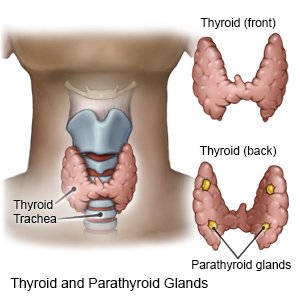Acquired Hypothyroidism in Children
Medically reviewed by Drugs.com. Last updated on Apr 2, 2024.
AMBULATORY CARE:
Acquired hypothyroidism
is a condition that develops when your child's thyroid gland makes little or no thyroid hormone. Thyroid hormones help control body temperature, heart rate, growth, and gaining or losing weight. Thyroid hormones play an important role in the normal growth and development of children. Acquired hypothyroidism usually affects children starting at 6 months of age. Some children who have hypothyroidism when they are born show signs and symptoms much later in childhood.
 |
Call your local emergency number (911 in the US) if:
- Your child has choking episodes or sudden trouble breathing.
- Your child faints or has a seizure.
Call your child's pediatrician if:
- Your child has swelling around the eyes, or in the legs, ankles, or feet.
- Your child becomes nervous or restless.
- Your child has diarrhea, tremors, or trouble sleeping.
- Your child has a fever.
- Your child has chills, a cough, or feels weak and achy.
- Your child's signs and symptoms return or become worse.
- Your child's skin is itchy, swollen, or has a rash.
- You have questions or concerns about your child's condition or care.
Signs and symptoms of acquired hypothyroidism:
The signs and symptoms of acquired hypothyroidism may be different depending on your child's age.
- Early signs and symptoms:
- Bulging soft mass in the belly
- Coarse or dull-looking facial features
- Delay or failure in growth and development
- Dry, flaky skin or brittle fingernails
- Hoarseness and a large tongue
- Later signs and symptoms:
- Depression, fatigue, or irritability
- Sensitivity to cold
- Learning, speech, or behavior problems
- Constipation
- Delay in sexual development
- Swelling of his or her whole body, very slow heartbeat, and trouble breathing
Treatment options
The following list of medications are related to or used in the treatment of this condition.
Medicines:
- Thyroid hormone medicine helps return your child's thyroid hormone level back to normal.
- Give your child's medicine as directed. Contact your child's healthcare provider if you think the medicine is not working as expected. Tell the provider if your child is allergic to any medicine. Keep a current list of the medicines, vitamins, and herbs your child takes. Include the amounts, and when, how, and why they are taken. Bring the list or the medicines in their containers to follow-up visits. Carry your child's medicine list with you in case of an emergency.
Help your child get more iodine as directed:
The thyroid gland uses iodine to work correctly and to make thyroid hormones. Your child's pediatrician may recommend foods that are high in iodine. He or she will tell you how much of these foods your child needs to eat. Milk and seafood are good sources of iodine.
Follow up with your child's pediatrician as directed:
Your child may need to see a specialist called an endocrinologist. He or she may need to return for more blood tests to check the thyroid hormone level. Write down your questions so you remember to ask them during your child's visits.
© Copyright Merative 2024 Information is for End User's use only and may not be sold, redistributed or otherwise used for commercial purposes.
The above information is an educational aid only. It is not intended as medical advice for individual conditions or treatments. Talk to your doctor, nurse or pharmacist before following any medical regimen to see if it is safe and effective for you.
Learn more about Acquired Hypothyroidism
Treatment options
Care guides
- Acquired Hypothyroidism in Children
- Hypothyroidism
- Induced Thyroid Disorders
- Subclinical Hypothyroidism
Symptoms and treatments
Medicine.com guides (external)
Further information
Always consult your healthcare provider to ensure the information displayed on this page applies to your personal circumstances.
